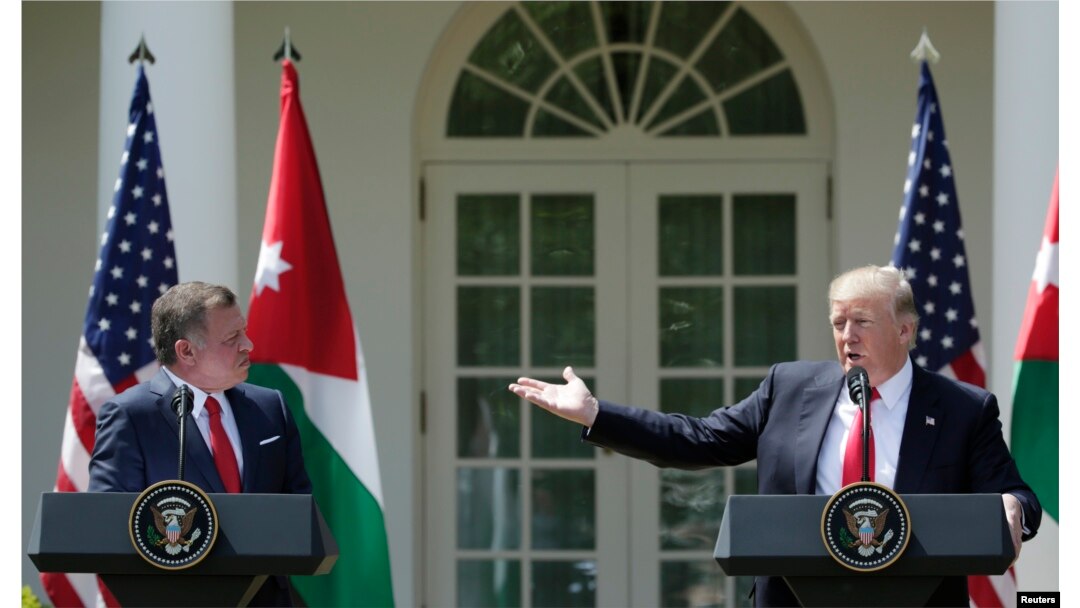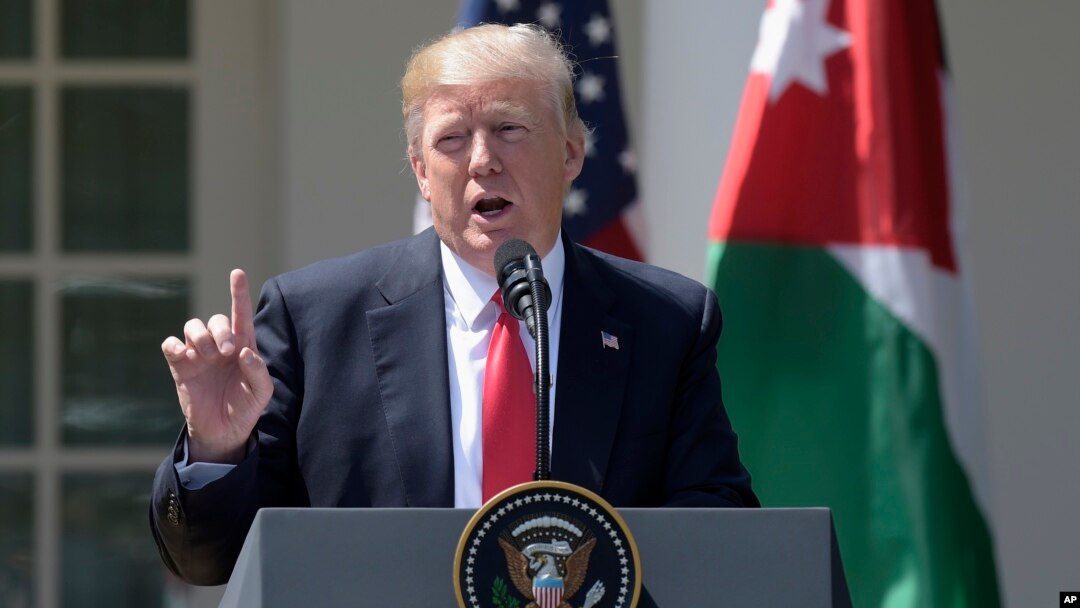U.S. officials from President Donald Trump on down have expressed outrage at the apparent chemical weapons attack in Syria, and have suggested that retaliatory action is being considered against Syrian President Bashar al-Assad’s regime, either by a multinational response or alone.
At a joint Rose Garden news conference alongside visiting Jordanian King Abdullah II, Trump on Wednesday said the attack "cannot be tolerated.”

U.S. President Donald Trump, right, and Jordan's King Abdullah II hold a joint news conference in the Rose Garden at the White House in Washington, April 5, 2017.
He did not rule out the use of retaliatory force, warning that the use of chemical weapons against civilians had “crossed many, many lines beyond a red line” for him.
"Yesterday's [Tuesday's] chemical attack, a chemical attack so horrific in Syria against innocent people including women, small children, and even beautiful little babies — their deaths was an affront to humanity,” he said. "These heinous actions by the Assad regime cannot be tolerated.”
While acknowledging that he is in charge in Washington now, Trump laid some of the blame for the chaos in Syria at the feet of his predecessor, Barack Obama, who famously threatened military action in response to a 2013 chemical attack in Syria, but did not follow through.
“I think the Obama administration had a great opportunity to solve this crisis a long time ago when he [spoke of] the red line in the sand,” he said. “And when he didn’t cross that line after making the threat, I think that set us back a long ways, not only in Syria but in many other parts of the world, because it was a blank threat.”
Tweeted otherwise
In 2013, however, Trump issued a series of tweets in which he urged then-President Obama not to attack Syria. One of them read: "The only reason President Obama wants to attack Syria is to save face over his very dumb RED LINE statement. Do NOT attack Syria, fix U.S.A."
But when asked Wednesday at a photo opportunity if he had any policy to deal with this new attack, Trump was circumspect. “You’ll see,” he replied.
The Jordanian monarch also condemned the attack, calling it “another testament to the failure of the international diplomacy to find solutions to this crisis [in Syria]."
U.S. Ambassador to the United Nations Nikki Haley shows pictures of Syrian victims of chemical attacks as she addresses a meeting of the Security Council on Syria at U.N. headquarters, in New York, April 5, 2017.
At the United Nations earlier in the day, U.S. envoy Nikki Haley castigated the international community for its inaction in the face of past atrocities, and seemed to suggest that the United States would act, with or without a multinational response.
“When the United Nations consistently fails in its duty to act collectively, there are times in the life of states that we are compelled to take our own action,” Haley warned. “For the sake of the victims, I hope the rest of the council is willing to do the same.”
Criticized Russia
Haley explicitly criticized Syria’s chief ally, Russia, which has used its veto power on the Security Council to prevent passage of resolutions condemning Syria’s use of chemical weapons.
“Assad has no incentive to stop using chemical weapons as long as Russia protects his regime from consequences,” she said.
The comments come just days after Haley said the U.S. is not focused on removing Assad from power.
From left, President Donald Trump's Chief of Staff Reince Priebus, Commerce Secretary Wilbur Ross and Secretary of State Rex Tillerson at the White House in Washington, April 5, 2017.
Secretary of State Rex Tillerson also spoke to Russia's support of Assad.
"There's no doubt in our mind that the Syrian regime under the leadership of Bashar al-Assad is responsible for this horrific attack," Tillerson said. "And we think it's time that the Russians really need to think carefully about their continued support for the Assad regime."
Trump's actions
Robert Satloff of the Washington Center for Near East Policy said that Trump's own words mean that he must now separate his administration's response to Syria from that of Obama's.
“The president’s own words and reactions suggest if he wants to separate himself from his predecessor, he’s going to have to take certain action,” Satloff said.
“By his words and demeanor, Trump has implicitly laid down a marker; I’m not going to say a red line," he added. “So if he does not take action, it would be a sign he is continuing the Obama administration policy. That cannot be the sort of idea the Trump White House would like to nurture.”
Abdul-Hamid Alyousef, 29, holds his twin babies who were killed during a suspected chemical weapons attack, in Khan Sheikhoun in the northern province of Idlib, Syria, April 4, 2017.
Satloff said the chemical weapons incident poses a major challenge to the nascent relationship between the Trump White House and the Kremlin.
“If the Russians are maintaining the folly that the rebels themselves were responsible for the chemical weapons, this really calls into doubt the idea that the U.S. can partner with Russia," he said.
Robert Danin, senior fellow at the Council of Foreign Relations, called this a defining moment in the evolution of Trump’s Middle East policy.
“What we’re seeing is the transformation, education and evolution of Trump to understand what America’s role in the Middle East is,” Danin said. “He came to power with a desire to limit America’s involvement in the Middle East, and I think he’s quickly realizing that that’s a lot harder to do than he may have thought.”
Nike Ching at the State Department contributed to this report.


